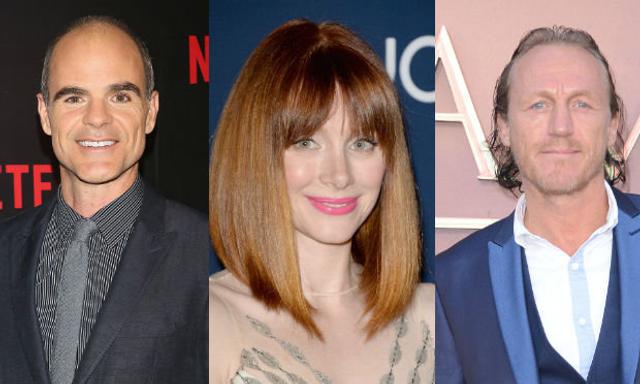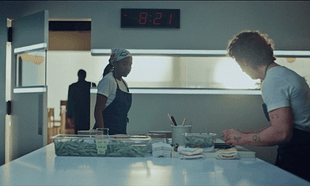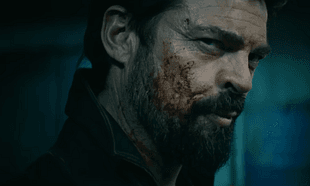*This review contains spoilers*
Black Mirror's long-awaited third season has arrived at last at its brand new home on Netflix, meaning you can devour as much of Charlie Brooker's mind-melting drama as you can handle in one sitting. This time round we were treated to six episodes instead of the normal three, and off the bat you can see the effect the injection of Netflix's budget had on the series, with higher production values that give an overall grander scale to each episode.
The core motif is still there however and Brooker has found even more new and profound ways of making us question the world we live in and the future we are rapidly hurtling towards. Technology may be our ally now, but Black Mirror has always found a myriad of ways to show how one day it could far too easily take one large bite out of our collective asses.
Brooker eased us in gently however with the first episode, 'Nosedive', starring the familiar face of Bryce Dallas Howard (Jurassic World, The Help) which is a fairly pointed commentary on our obsession with approval on social media. You know it well - your post on Facebook gets a lot of likes, your tweet is retweeted, you get a match on Tinder - look, it doesn't feel awful. However, in 'Nosedive', these likes and ratings are not confined to technology but rather the entire world is built on them. Your approval rating is your ticket to success, and every single person you come in contact with can rate you, leading to a queasy cheese-fest of interactions with everybody afraid to offend anybody and all sense of genuineness long lost.

Lead character Lacie's demise begins when she gets an invitation to a popular friend's wedding, where she must make a speech, giving her the perfect opportunity to improve her score that will help her rent the apartment of her dreams. However, the journey is not without its hurdles and the lesson at the end is clear, but for once Brooker let us have a somewhat uplifting closing - most likely the influence of his writing collaborators in this episode, Mike Schur (creator of The Office and Parks and Recreation) and actress Rashida Jones (Parks and Rec, The Office).
If you were starting to feel at ease after episode one, 'Playtest' undoubtedly tore you right out of your comfort zone. Starring Wyatt Russell (the offspring of Goldie Hawn and Kurt Russell) as Cooper, and directed by Dan Trachtenberg (10 Cloverfield Lane), the episode took us into the world of video games, where the likeable Cooper found himself at a testing facility in London to earn some extra cash. This wasn't any ordinary video game however as it involved the user being physically inserted with a chip in their neck that would sync up with their mind and know just exactly how to terrify them. Cooper then headed off into a haunted house setting where his every worse fear came to be, diving him to the brink of despair, while Brooker tormented us with 'Inception-style' moments leading us to believe it to be over when it wasn't. This one is not recommended before bedtime, we learned that the hard way.

Things got darker again in 'Shut Up and Dance', which starred Game of Thrones' Jerome Flynn and Alex Lawther, whose lives get thrown together when they are both blackmailed by the same unknown party. One for an affair, and the other for getting caught on camera masturbating. They must do whatever is asked of them, no matter what it is, or all is leaked. It's a tension filled episode with as bleak an ending as you can imagine, but it clocks in some great performances from Flynn and Lawther, even though they are giving us a relentlessly grim look at the dark side of human nature.
Episode four however brought us some much needed relief as we were thrown back into the eighties with 'San Junipero' - the story of an evolving relationship between two women that meet in what appears to be a tourist town. This one takes a while to clock what the hell is actually going on, but it eventually becomes clear as we see that Brooker is taking a look at our complicated relationship with death and the afterlife. The love story may seem a little rushed at times, but the soundtrack and ultimate ending is as uplifting as anything we've ever seen on Black Mirror.

The penultimate episode, 'Men Against Fire', brought us to an army setting in a world invested by these so-called Roaches, who are zombie-like creatures terrifying the population. Once more though, all is not what it seems, as we realise that the soldiers have been implanted with a chip to make them see some humans as monsters in order to make killing them easier. It's a dark look at how unevenly human life is valued with a unsettling nod towards actual events that have sadly occurred in our history. House of Cards Michael Kelly also makes his mark in this episode as the 'friend or foe' army counsellor.
Black Mirror's big finale came with 'Hated in the Nation', starring Kelly MacDonald (Trainspotting, Intermission) and Faye Marsay (Game of Thrones) who live in the not-too-distant future where bees are now extinct and have been replaced by robotic versions and an internet hate campaign is leading to the unexplained death of its targets. Trolls beware, because Brooker is coming for you in this one, and he doesn't hold back on his retribution. Possibly our favourite episode of this entire third season, 'Hated in the Nation' could easily work as a stand alone movie and would be killing it at the box office if it was.
Overall, once more Black Mirror has failed to disappoint and made it worth the two-year wait for a new season. The questions are getting broader, but the target remains the same - us - the entire human race and the not so indestructible world we are building for ourselves, or more so, letting being built for us. Brooker has been known for his accidental foreshadowing of actual events (David Cameron, we're looking at you) but the sense of unease in watching any episode of Black Mirror doesn't come from the fear that we may one day live in one of the many dystopian worlds he creates, it's that we already do.












































































